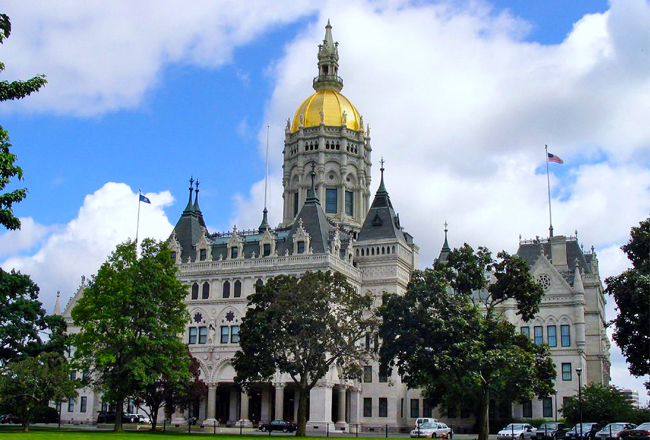Connecticut House of Representatives passes state budget bill
Connecticut”™s House of Representatives voted last night 86-65 to approve a two-year, $43.3 billion state budget.
 Five Democrats joined the House”™s Republican bloc in opposing the bill, which is designed to raise $861.5 million in additional revenue during its first year and $921.3 million in its second year as part of the strategy to close Connecticut”™s $3.7 billion deficit.
Five Democrats joined the House”™s Republican bloc in opposing the bill, which is designed to raise $861.5 million in additional revenue during its first year and $921.3 million in its second year as part of the strategy to close Connecticut”™s $3.7 billion deficit.
The budget increased taxes on alcohol beverages ”“ although the excise tax on craft brewery beer was cut in half ”“ and on digital downloads. A new 10-cent-per-bag tax was placed on the use of plastic bags from grocery stores and other retailers, and a 1% surcharge on restaurant food and other prepared meals was added.
A new tax was imposed on e-cigarettes, but a proposal by Gov. Ned Lamont to add a tax on sugary drinks was absent from the budget. Sales tax exemptions that were extended to dry cleaners, interior design services, parking lots and safety apparel were eliminated. A so-called “mansion tax” on the sale of luxury housing was included in the budget, but a higher tax on wealthy residents did not make the final cut.
The question of tolls was not addressed in the budget ”“ a special session was set up to address the issue, although Lamont sought to have the matter settled prior to the end of this legislative session. Instead, the budget diverted approximately $58.2 million in revenue from the Special Transportation Fund in its first year and $119 million from its the second year into the General Fund. The budget also increased the income eligibility limits on the HUSKY A Medicaid program for working-poor adults with children from 155 percent of the federal poverty level to 160 percent, which would expand the program to accommodate roughly 4,000 more people.
The budget offered little in the way of spending cuts for government programs, although it eliminated the $250 business entity tax that companies were required to pay every two years. But limited liability partnerships and limited liability corporations will be paying increased filing fees, and a previously approved plan to end the surcharge on the corporation tax was cancelled.
The budget will now go to the Democrat-controlled Senate. The legislature”™s current session is scheduled to end on June 5.